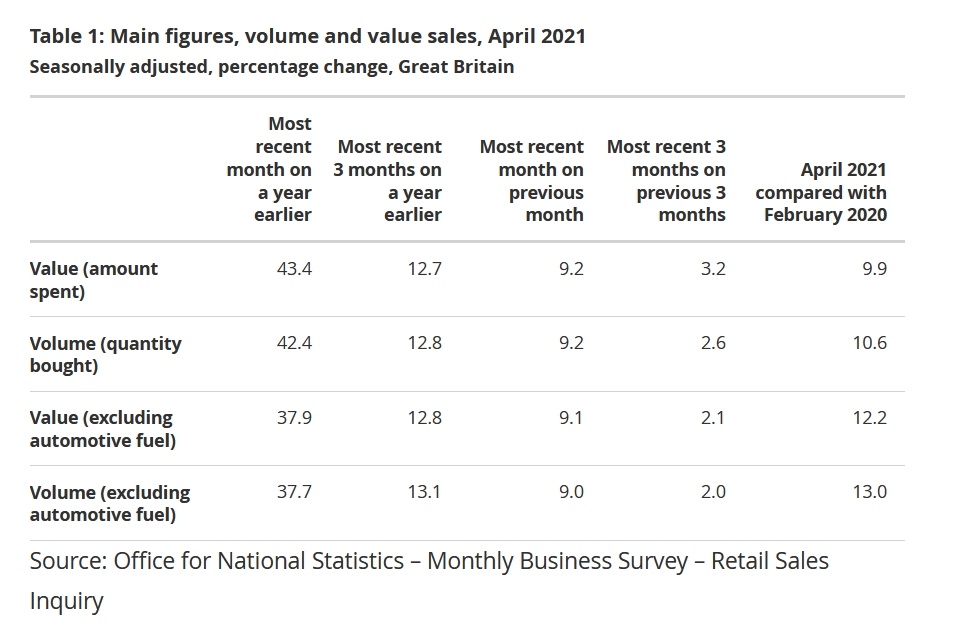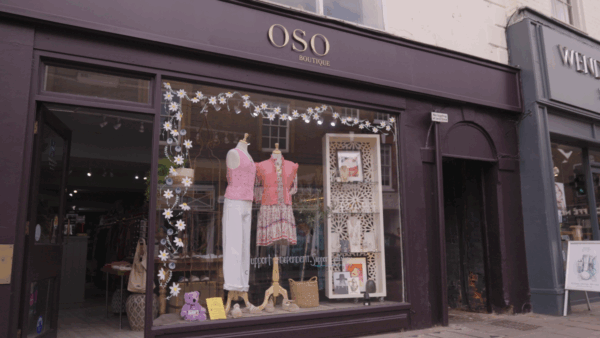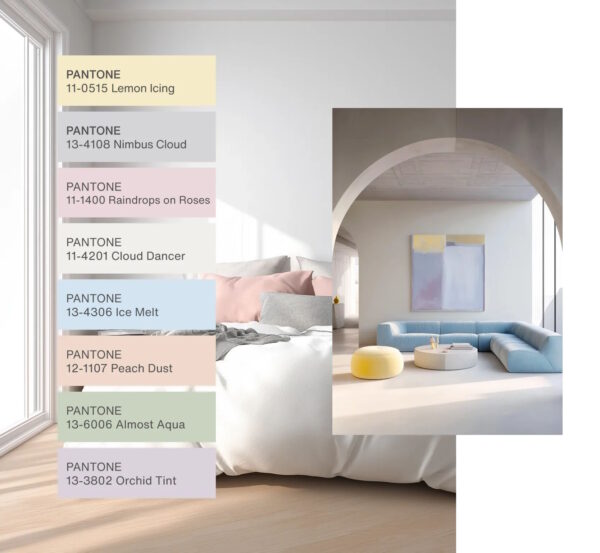Retail sales volumes grew sharply in April 2021 according to latest figures from the ONS, with a monthly increase of 9.2% which reflected the effect of easing coronavirus restrictions, including the re-opening of all non-essential retail from 12 April in England and Wales and from 26 April in Scotland.
Non-food stores provided the largest contribution to the monthly growth in April 2021 sales volumes, aided by strong increases of 69.4% and 25.3% in clothing stores and other non-food stores respectively.
Retail sales volumes were 42.4% higher than in April 2020, which was affected by the first national lockdown when the tightest restrictions were in place; however, these growth rates are distorted by base effects and are not a reliable guide; sales volumes were 10.6% higher than February 2020, before the impact of the coronavirus pandemic.
Delia Prudence, owner of The Art Room, an art supplies shop in Scarborough, said: “We were expecting to be busy in April but not that busy. The tills were ringing non-stop. One customer even came in with a bottle of Prosecco to celebrate us reopening. Shopping is part and parcel of our daily lives and people have clearly missed it a lot in recent months. What we’re also noticing is that people are asking us how we’ve been doing and seem genuinely interested in our welfare and continued presence on the high street. After a year of what can only be described as retail hell, we’re feeling a lot more upbeat and are confident about the future.”
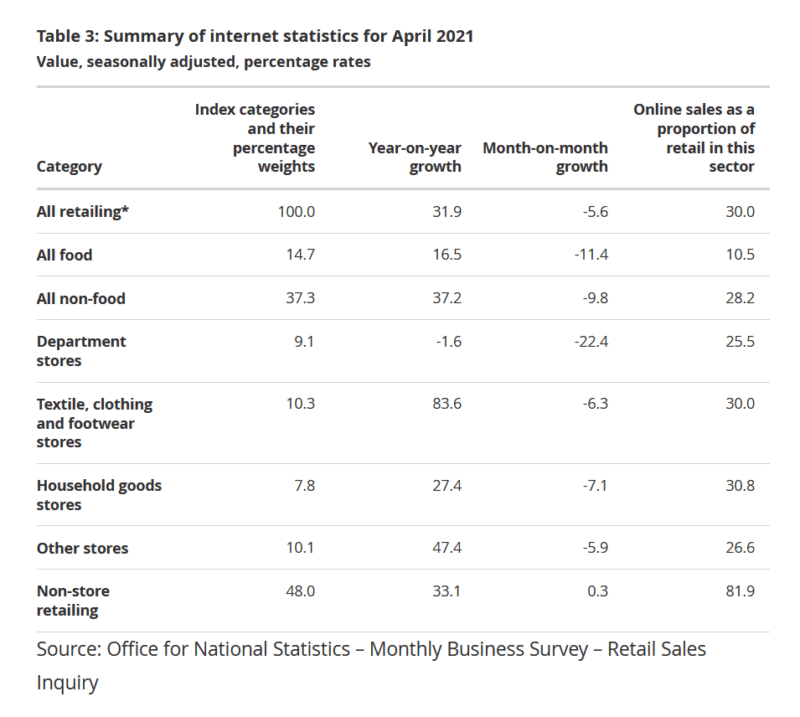
All retail sectors reported a fall in their proportions of online sales as physical stores re-opened during the month; as a consequence, the total proportion of sales online decreased to 30.0% in April 2021, down from 34.7% in March 2021.
In the three months to April 2021, the volume of sales increased by 2.6% when compared with the previous three months, with strong growth in department stores and automotive fuel retailers of 9.9% and 8.9% respectively.
The value and volume of sales were both up 9.2% when compared with March 2021 reflecting the impact of the re-opening of all non-essential retail stores in April. This signalled continued recovery in the retail sector following the growth in March (5.1%) and February (1.8%). The strongest monthly growth in April 2021 came from clothing stores, other non-food stores and automotive fuel retailers of 69.4%, 25.3% and 10.6% respectively.
Barry Whitehouse, owner of The Artery, a small art shop in the market town of Banbury, said: “It was wonderful to see the town centre buzzing with shoppers again in April. Seeing customers old and new coming through the door really lifted my spirits. I feel really confident about the future of the High Street as so many people say how much they have missed shopping, and browsing. It’s clear people appreciate the small businesses of their local towns more than ever.”
Estimates for both the amount spent and the quantity bought were higher in April 2021 than a year ago, when severe lockdown restrictions were implemented.
The amount spent increased by 43.4% and the quantity bought increased by 42.4% when compared with April 2020. However, percentage change over the past year should be interpreted with caution because of base effects; the base month was affected by large falls in retail sales during the first national lockdown, when the tightest restrictions were in place.
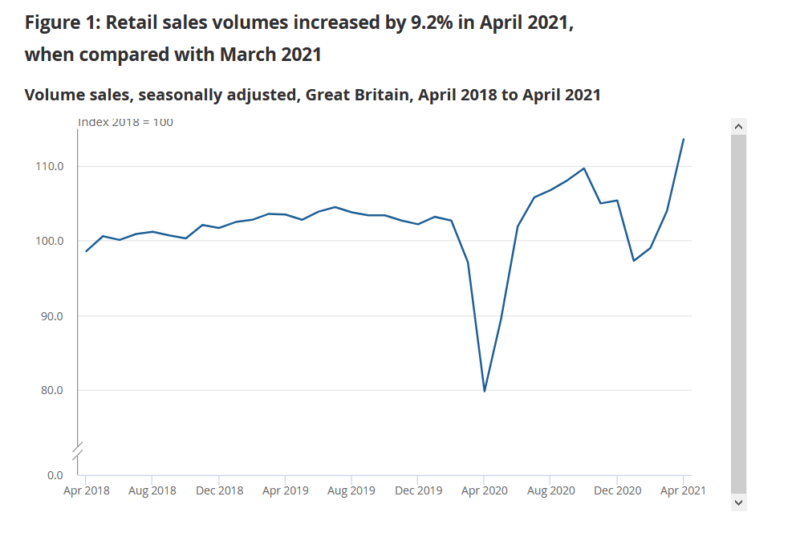
A more useful comparison is with February 2020, before the first lockdown. Total retail sales levels for both the amount spent and quantity bought were up 9.9% and 10.6% respectively compared with their pre-coronavirus (COVID-19) pandemic February 2020 levels.
Longer-term comparisons show the continuing impact of the pandemic. Non-store retailing (retailers with no physical store presence) was the sector to report the largest growth of 56.0% when compared with April 2019, highlighting a change in consumer behaviour caused by retail restrictions during the pandemic. Automotive fuel retailers continue to record sales lower than pre-pandemic levels, down 13.3% when compared with two years previously, as homeworking and reduced travel continues to impact the sector.
Dr Jackie Mulligan, an expert on the High Streets Task Force and founder of local shopping platform, ShopAppy.com, commented: “In April, there was a perfect combination of pent-up demand and savings to spend. We had fantastic reports from our local businesses, with some owners receiving gifts from local customers on reopening, and many reporting being busier than they expected. It is clear that there has been a pent-up demand to pop into shops for months. The pandemic has put hyper-local shopping very much on the map, which is great news for high streets around the UK. Sustaining local recovery will rely on customers continuing to support local and understanding that shopping local is for life, not just for lockdown.”


